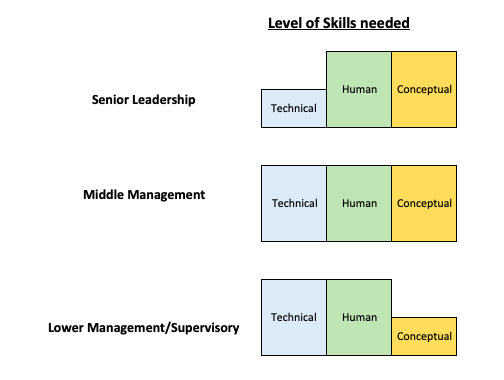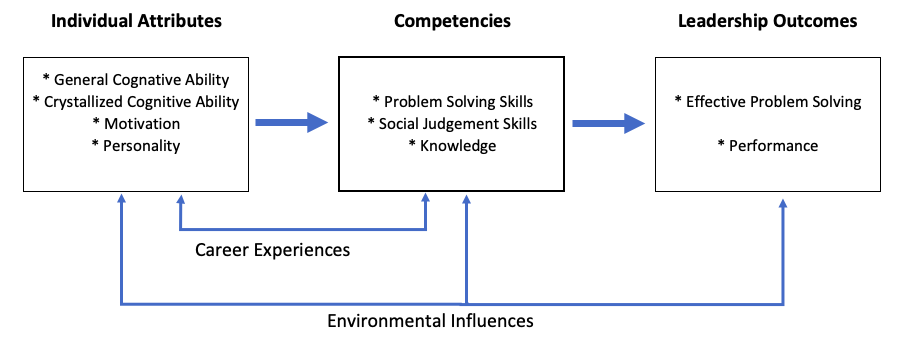
Leadership can mean a variety of things to different people. Perhaps you regard your current manager as a leader, or maybe you think it relates more to the executive leadership in your organization?
You might think that leaders require a diverse range of skills or you might think that they don’t need many at all.
Whatever you might think about leadership in your organization (or others), what it boils down to is relatively simple – Leadership is using skills to achieve business goals and objectives.
In this article, we’re going to look at the Skills Leadership Theory. This theory aims to help us understand those skills and attributes that help generate leadership.
The Skills Leadership theory aims to model leadership on skills that are learned rather than an alternative of leaders having some form of innate “superhero skills” that enable them to lead. This potentially opens up leadership to everyone.
What is the Skills Leadership Theory
Skills Leadership Theory has been born from the work of two key researchers.
Firstly, Robert Katz in the Harvard Business review in 1955 and secondly Michael Mumford (and associates) more recently in 2000. While they offer slightly differing views, their models can be seen as complementary as both look at how learned skills influence leadership.
Let’s take a look at each one in turn.
Katz argued that there were three core types of leadership skills in the workplace:
1/ Technical Skills
These skills are those that make the leader technically competent in their function – i.e. if the manager worked within the Supply Chain function, they would have specific technical competencies around that subject matter.
Interestingly there is a school of thought that sub-ordinates look up to those with high levels of skills/proficiency in their area of expertise; which could enhance leadership credentials.
2/ People/Human Skills
These are vitally important skills within an organisation or when running a team and include skills such as:
- Communication
- Delegation
- Motivating
- Monitoring performance
- Feedback/coaching
- Empathy
3/ Conceptual Skills
As a leader, just being proficient in your area of technical expertise is not sufficient. Leadership requires certain “business” skills that are also needed. These include:
- Planning
- Goal setting
- Strategy development
These skills have little to do with the subject matter the leader may specialize in but relate to those core skills of running a business.
Balance of skills
It’s worth reminding ourselves again that all three skill sets can be learned, you are not born with the ability to develop a business strategy; instead, you are taught it and gain experience in it.
As we can see from the above, leadership is multi-faceted and requires a balance of a range of skills.
For example, should a leader focus too much on technical skills, they may not have sufficient time to focus on people management.
An essential requirement of effective leadership is to balance all of these skills together, producing a rounded (and high performing) persona.
The impact of a Skills-based leadership model
As the skills we have described above are learnable, the key takeaway from Katz’s theory is that leadership is available to all.
The model implies that If you want a leadership role, simply learn the skills and apply them!
Of course, the reality is that it’s not that simple.
These skills can be learned, but in reality are there various other factors to consider? What about experience, for example? Does that have a part to play?
Different levels of leadership require different levels of skills.
Now we’ve seen how the theory identifies the skills leadership requires let us consider for a moment if these skills have equal parity with each other at all stages of the organisational hierarchy.
Are these skills equally important, regardless of the seniority of the leadership role being undertaken?
Katz argued that the importance of each skill varies depending on the seniority of the role being undertaken.
This is illustrated in the chart below.

As you can see from the chart – all levels of management need skills but in varying degrees. Katz argued that:
- Those in lower-level management/supervisory roles relied more on technical skills rather than conceptual skills.
- In Middle Management roles the split was equal
- In senior management or executive roles, there was more reliance on conceptual skills with less reliance on technical skills. This is as a result of their function within the organization and the tasks they are likely to undertake.
So in summary – Katz theorised that:
- Leadership required 3 key skills at all levels
- Technical
- Human
- Conceptual
- Requirements for each skill varied at leadership level
- Those in lower level leadership roles relied more on technical skills
- Those in higher level leadership roles relied more on Conceptual skills
Mumford model of skills leadership
Mumford developed an alternative skills based leadership model, in the 2000’s, that focussed on those parts that create the maximum levels of performance.
The model can be visualized as a capability model studying the relationships between a leader’s skills and knowledge.
The model features five parts which we can see in the diagram below:

The model highlights the relationships between the following characteristics:
1/ Individual Attributes
- General Cognitive Ability (A leaders intelligence)
- Crystalised Cognitive ability (what a Leader has learned)
- A Leaders motivation
- A Leaders personality
2/ Competencies
This model highlights three key competencies, identified these as the key factors that drive performance.
- Problem-solving skills
- Social Judgement skills
- Knowledge
These, in turn, have a relationship with leadership outcomes:
3/ Outcomes
- Effective Problem solving
- Performance
The model then expands to examine the relationship between Career Experiences and Environmental influences on Leadership.
As you probably know from yourself, experience can have a massive influence on your work-life. Experience gives you opportunities to learn, improve, and gain confidence in your abilities.
External Environmental influences can also do the same and shape the work situation you operate in, also providing (or restricting) access to areas of knowledge and personal growth.
The model portrays career experiences influencing individual attributes and competencies.
Mumfords model portrays these as influences that can affect the individual, their competencies, and leadership outcome.
It is interesting to note the importance that Mumford places on Problem solving skills within his model. If you’re interested in Problem solving you can check out our Problem Solving Model article here.
Issues with Skills Leadership Theory
As with all theories and models these Skills Leadership theories are open to some criticism. Firstly, let’s look at the issues with Katz theories:
Katz argued that by understanding the types of skills required by Leadership roles, those looking to develop their leadership skills could review their abilities, analyze where gaps exist, and then develop these skills to enhance their abilities. Thus putting themselves in a position where they can attain leadership roles.
This is fine in theory, but is thier more to leadership than skills alone? There is some debate about whether some leadership skills are innate and how much they can be learned, and of course, this does not mean that everyone attains the same level of expertise. Some leaders may prove more adept than others. And what about external factors like relationships or networks, can it be argued that on occasion these are more important than skills?
Now let’s look at the issues with Mumford:
From Mumford’s model, it would appear that there is a wide breadth of skills that are required to develop excellent leadership. It could be argued that these are too general and that the model doesn’t specify the necessary specific skills.
You could consider that there is indeed a vast array of possible skills required to excel at leadership and these may vary between industries, countries (socio/economic environments) and the competitive requirements of the market.
Consider for example someone operating in a highly regulated market, will someone leading an organisation in this circumstance require the same skills as someone operating in a de-regulated market?
Clearly leadership relies on skills, but without clarity, the model remains fuzzy even if you can see from the model how these can be applied.
Alternative Leadership Theories
If you’re looking to study leadership theories and models, there are several. All look to decipher how leadership is created and sustained, understanding these help to put the Skills Leadership theory into some context, and I’d suggest that you research the following:
- Trait Leadership Leadership Theory – Theorises that innate personality traits are common in leaders. This means (unlike Skills leadership) that leadership is a natural skill that cannot be taught, implying that not everyone could become a leader.
- Behavioral Leadership Theory – focuses on behavioral attributes of leaders
- Contingency Leadership Theory – focuses on how situations shape leadership
(Incidentally, for the full list of alternative leadership theories, you could do worse than check out Kendra Cherry’s excellent article at Verywellmind.com
Finally, do remember that you are not limited to one theory, individuals can move between, or sit within multiple approaches.
Summary
We hope you enjoyed our post on skills leadership theory. Hopefully, you can identify with the skills detailed within the theories and that you can use this information to focus on your own leadership skills.
What do you think of the concept that leadership is a skill that can be learned? Do you agree? Do you think it’s true at all levels of seniority?
Have an opinion on this? Want to contribute to the article by commenting? We’d love to hear from you. You can leave a comment below or fire us a message on twitter -we’d love to hear from you.
This post is part of our Management and Leadership Guide.